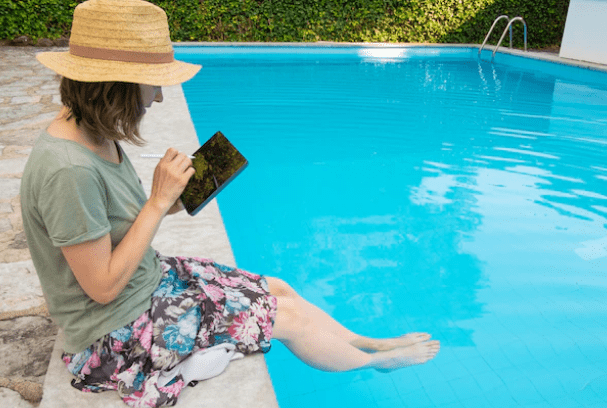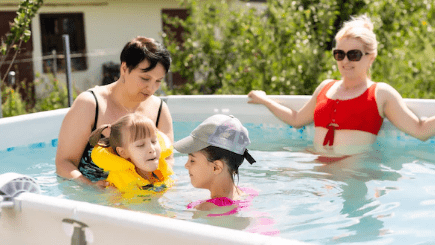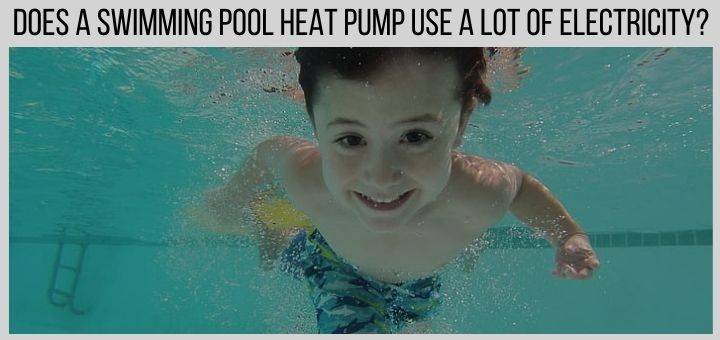Does a swimming pool heat pump use a lot of electricity, There are a number of factors to consider when evaluating how much electricity is used by the pool heat pump. The size and type, or whether it’s gas-powered, makes a big difference in power consumption. For example, an electric heat pump will use less energy than one that runs on natural gas because there’s no need for fuel delivery costs.
On top of this, solar water heating panels can also cut down on your electrical usage since they’re not running all day long but only during inclement weather.
Cooling pools with just air conditioners may actually be more expensive over time than using pumps if you don’t have enough insulation around the unit or proper ventilation within the house where it’s installed so make sure these things are in order before you start complaining and blaming the heat pump.
How to minimize your heating bills when you have a swimming pool

Insulate your water pipes and skimmers to retain heat
Turn off the pool pump when you’re not using it, which is usually at night time or early morning. You shouldn’t be swimming in a heated pool during these times anyway!
Install solar panels if you don’t have them already for heating your pool up cheaply with renewable energy. This will also cut down on electricity consumption as air conditioners use more power than pumps under normal circumstances.
Covering the surface of the hot tub can reduce evaporation rates by 60% – this retention of warmth has a domino effect that’ll make your other electric appliances last longer because they won’t need to work so hard to keep things warm any
A swimming pool heat pump is a great way to reduce your heating bill. The installation of one can help you save up to 30% on electricity costs, but the cost depends on how much additional energy they need for an entire season as well as if it needs any other equipment such as solar panels or batteries.
In addition, make sure that the pool pump has been designed specifically for use in homes and outdoor pools before purchasing one: these are specially made with safety features like sensors that detect when there’s a problem with the filter system.
Does a swimming pool heat pump use a lot of electricity?
- The answer to this question is no, a swimming pool heat pump does not use much electricity
- A swimming pool heat pump uses about the same amount of electricity as an air conditioner
- It’s important to remember that your energy bill will be higher during the winter months when you are using your heating system more often
- If you have any questions or concerns about how much power a pool heater might use, ENERGY SAVER Heating and Cooling for more information!
- We take pride in being able to provide our customers with accurate answers and professional advice on all their home comfort needs!
A swimming pool heat pump can use a lot of electricity if it is not sized properly, especially in the south where summer temperatures are high. Swimming pools require more energy to keep them at a constant temperature than other types of heating and cooling devices do because water cannot store or release as much heat. A common problem for homeowners who have replaced
Why a swimming pool heat pump is better than solar heating

A swimming pool heat pump works almost as well and is a lot cheaper than solar heating, which has its own drawbacks.
Solar panels are expensive to purchase and install on the roof of your home so you can’t use them for heating your house in wintertime when they produce no power. They also require costly repairs once every decade or two because they’re not designed for long-term exposure to sunlight.
Heat pumps cost less upfront but their efficiency drops off over time while solar cells continue producing electricity even after decades of use without any maintenance costs.
What’s more, if there’s ever an emergency such as a hurricane that knocks out power lines then you’ll need some other way to keep yourself warm since it will be impossible
A swimming pool heat pump is more cost-effective and efficient than using natural gas or oil to keep the water warm but it requires electricity to operate.
A solar water heater is a cheaper way to keep your pool warm and you don’t have to worry about power outages since they use the sun’s heat instead of relying on man-made energy sources.
We recommend using a solar water heater for pools because they’re more cost-effective, efficient, reliable, and environmentally friendly than swimming pool heat pumps.
Does a swimming pool heat pump use a lot of electricity? Solar panels are an option but not many homes or businesses are in areas with enough sunlight throughout the year so chances are that this isn’t feasible for most people who live further from the equator. A much better choice would be installing either natural gas or propane as well as
THE SOLUTION
Swimming Pool Heat Pump Maintenance Tips… When a solar-powered swimming pool heater is installed, the installation company will usually perform yearly maintenance on it every spring and fall before we turn off our pools for winter.
If you have an electric or gas-powered system, check with your service provider about how often they’ll need to be serviced–they should tell you what type of upkeep may be required in order to keep them running smoothly all year long!
It’s important that these systems are checked regularly so as not to waste precious energy during those cold winter months when there isn’t enough sun shining down from above. A malfunctioning heat pump can cause serious problems for your pool heater, and that can include leaks in the system or a total breakdown of the electrical components.
In addition to checking for problems with our pools’ heat pumps every spring and fall before shutting them down for winter storage, we also make sure all of our regular filters are changed out at this time as well–that way they’re
The answer to this question is that it depends. If the swimming pool pump system has a heat exchanger, then yes because in these systems an electrical compressor pumps refrigerant through the tubing, where it evaporates and absorbs heat from the air.
The coil of refrigerant carries the now-cooled liquid back into the outdoor unit, where it’s reheated; after which some of its vapor—which contains absorbed warmth—turns gas again by cooling down until it condenses on metal fins outside before being pumped back inside for another round of heating up.
In contrast, copper coils can be used without electricity as long as water flows over them with enough velocity so that they won’t freeze (with frost). These types use no power at all.
Does a swimming pool heat pump use a lot of electricity?: – It depends. If the swimming pool pump system has a heat exchanger, then yes because in these systems an electrical compressor pumps refrigerant through the tubing where heat is generated.
If the swimming pool pump system does not have a heat exchanger, then no, because in these systems the refrigerant is cooled to a temperature below its boiling point.
A swimming pool heat pump uses electricity, but it also saves you from using your air-conditioning or heating system. It will lower the electric bill by turning off a central HVAC unit for those hours when the swimmer is in class and only needs to keep water at an appropriate temperature. This can save both money.
In addition to saving energy use, a hot tub cover notifies swimmers that they need help with their workout so they don’t overheat while swimming laps. Pool covers are designed to be large enough for two people; this means that if one person notices someone else struggling during lap swims, he/she can go get assistance without interruption. (Related Article: Best Electric Pool Heaters for In-Ground Pools)
- 26 Backyard Shower Ideas That Turn Your Outdoor Space Into a Spa - July 11, 2025
- 26 Breathtaking Farmhouse Kitchen Designs to Inspire Your Remodel - July 10, 2025
- 22 Modern Dark Bedroom Aesthetic Ideas You’ll Love and Copy - July 9, 2025

